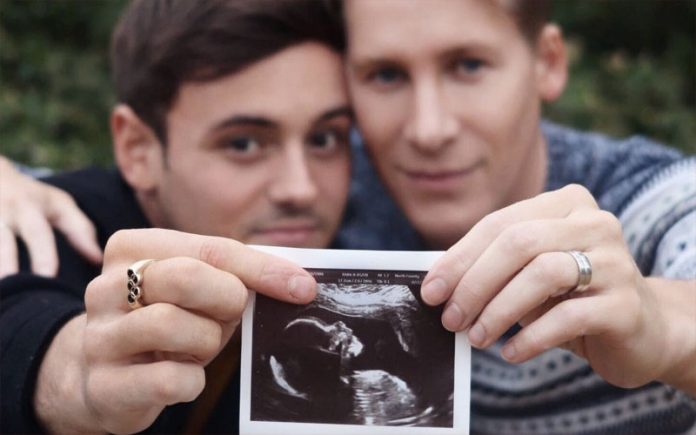This week the twitterverse celebrated the arrival of baby Robert Ray Black-Daley via surrogacy. Baby Robert was conceived using donor eggs and the sperm of either Tom Daley or Dustin Black. From the pregnancy announcement, to the surprise baby shower to their decision to raise the baby in the UK, the news has focused exclusively on the desires of the men involved, even though it is baby Robert who has to bear the life-long cost. As children’s rights advocates, we find that kind of media coverage not only unacceptable, but entirely unjust.
For this boy to become Robert Ray Black-Daley, he had to sacrifice his fundamental human rights, his social-emotional needs, and likely his own desires for a mother. So let’s take a look at what baby Robert had to experience so that he could join this modern family:
Trauma: Last month, when border separations were making headlines, everyone viewed the loss of one’s parents to be unacceptable because it is deeply traumatic for children. But when surrogacy comes on the scene, especially in the name of a gay couple’s “right to parenthood,” government will literally guide you through the process.
The reality is that losing a parent is always traumatic for children, even at birth. Studies show that separation from the birth mother causes “major physiologic stressor for the infant.” In addition, even brief maternal deprivation can permanently alter the structure of the infant brain. While there are times when adoption is necessary, adoptees have long referred to a “primal wound” as a result of maternal separation which can hinder attachment, bonding, psychological health, self-esteem, relationships, etc. Here’s what one woman, who was unknowingly trafficked in a black market adoption ring at birth, had to say about surrogacy:
The willingness to *entirely* disregard the health and well-being of the child in [surrogacy] transactions is unconscionable. The events of my birth are now 65 years ago, but the effects of being sold are universal, because they derive from breaking the bonds formed during pregnancy between the mother, and her embryo, fetus, and ultimately, child… I’m not suggesting I remain a victim of these circumstances, but I also spent 25 years in therapy to undo the damage. It’s been a lifetime’s work.
Losing a biological parent. Now that we have a couple decades of sperm donation under our belt (ah-hem), we don’t have to guess how these children feel about being intentionally denied a relationship with their father or mother. One major study found that nearly two-thirds of children conceived from sperm donors believed that “my sperm donor is half of who I am.” In addition, despite being desperately wanted– the magical cure that is somehow supposed to wipe away any loss- these children often struggle with genealogical bewilderment. Ellie writes of how she felt after discovering that she was donor-conceived:
“The nose I thought had come from my dad wasn’t his. That round nose that I thought connected me to family was suddenly hideous. The shape of my fingers, so similar to my dad’s, now looked alien and terrifying. There were several years in my mid twenties when I couldn’t look at myself in a mirror without bursting into tears, so I avoided mirrors.”
Daley and Black say that they don’t know which of them is Robert’s father and that they don’t care. Robert probably will. And there’s a good chance that Robert, like many other donor-conceived children, will search tirelessly for his biological mother.
Intentional motherlessness. Despite the fact that it took two women- his genetic mother and the surrogate mother- for Robert to come into existence, we continue to hear that “gender doesn’t matter in parenting” and that “all kids need is love.” Not only is that an unscientific statement, it’s also refuted by the stories of children with same-sex parents who longed for the dual-gender love that children are made to crave. Brandi is one such child. She shares:
I yearned for the affection that my friends received from their dads. As far as I was concerned, I already had one mother; I did not need another. My dream was that my mother would decide she wanted to be with men again, but obviously that dream did not come true. My grandfathers and uncles did the best they could when it came to spending time with me and doing all the daddy-daughter stuff, but it was not the same as having a full-time father, and I knew it. It always felt secondhand.
Robert, like many other children with same sex parents, will probably gravitate toward the women in his life- the mothers of his friends or his female teachers or aunts of grandmothers. Why? Because Robert, like all other children, are wired for both paternal AND maternal love. And he won’t stop needing the love of a mother just because it’s politically incorrect.
Commodification. Daley and Black likely spent over 100K on the egg and surrogate needed to make baby Robert. There’s a good chance that someday baby Robert will feel like he was purchased. How do we know? Because many children conceived via the fertility industry feel like they were treated as a product. The largest study ever conducted on children born of sperm donation reveals that almost half of them are “disturbed that money was involved in their conception.” Jessica, a surrogate-born woman writes:
When you know that a huge part of the reason that you came into the world is due solely to a paycheck, and that after being paid you are disposable, given away and never thought of again, it impacts how you view yourself.
I’m sure that Daley and Black will continue to post pictures of this precious boy as he grows, and receive all the accolades that a “tolerant” society like our is expected signal. But don’t be deceived into thinking that “love” made this family. This family exists because the most powerful members of the family chose loss for it’s most vulnerable member. And that loss will impact baby Robert… for life.























